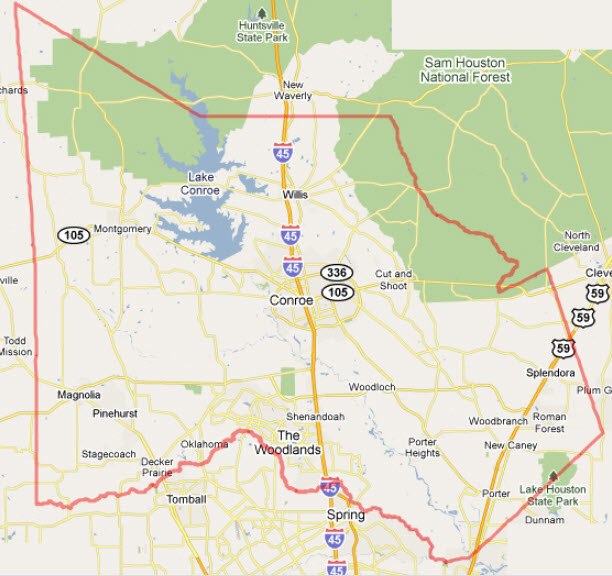Exploring the Montgomery County Texas Court System – All You Need to Know

Do you ever find yourself curious about the court system of Montgomery County, Texas and all the different processes and procedures it follows? Have you been wanting to know more about navigating the county court system but have absolutely no idea where to start? Well, look no further! In this blog post, we’ll be learning all about the Montgomery County court system, from court locations and hours, to steps to filing a civil case, to understanding the various services/resources available to citizens. Together, we’ll uncover everything you need to know about the Montgomery County court system.
The Montgomery County Texas court system is composed of several district courts, an intermediate county court, and a county court at law. The court system also has several associated offices to provide assistance with filing documents, scheduling hearings, and more.
The Montgomery County Texas Court System
When considering the Montgomery County, Texas court system, understanding the scope and structure is essential. The county is comprised of many different types of courts that are responsible for various matters of civil and criminal law. At the highest level, there is the Court of Criminal Appeals which is responsible for almost all legal matters in the county. Below this court is a series of district courts that handle smaller criminal matters as well as civil cases such as minors in possession and breach of contract lawsuits. Finally, there are municipal courts which preside over minor cases such as traffic tickets, misdemeanors, probate issues, and juvenile cases.
Throughout this court system there can be debate over which particular body should preside over certain types of cases. For instance, some view the Court of Criminal Appeals as best suited to handle complex criminal cases due to its broad jurisdictional scope, while others might argue that district or even municipal courts could take on similar workloads which would be easier to manage given their more limited responsibilities. Ultimately it is up to each individual court’s discretion to decide how they want to allocate resources and personnel among their various divisions.
No matter how one feels about the specifics of the court system’s approach to justice, it is clear that Montgomery County’s judiciary provides a responsible platform for residents to address their legal grievances.
The Montgomery County court system is comprised of a Court of Criminal Appeals, district courts, and municipal courts which are responsible for handling criminal and civil cases. It can be difficult to decide which court handles what types of cases and so it is ultimately up to the discretion of each court’s resources. No matter how this system works, it provides a platform for residents to address their legal grievances.
Overview of the Court System
The Montgomery County court system is set up to operate in the interest of providing justice for those living in the area. With a structured system of procedural law, it drives its proceedings through procedures built on fairness and equity. This structure ensures that the people involved in the case receive just outcomes that are based on legal principles rather than individual interpretations.
This structure allows for multiple levels of appeal should a decision appear unjustified. Moreover, there are several preventative measures put into place to ensure that civil proceedings move efficiently and arrive at just conclusions. One example of such a measure is that parties can settle their disputes outside of court through mediation, allowing for quicker and more harmonious resolutions without risking an outcome unpredictable to either party.
With a established caselaw, lawyers within the county understand what principles guide the rulings handed down by judges so they must be aware of these cases precedent while preparing their arguments. This typically encourages thoughtful consideration when formulating the best defense meaning more favorable settlements for those involved in any lawsuit.
On balance, the Montgomery County court system serves as an efficient judicial agency providing just outcomes for those living there with mechanisms built in place to protect those faced with civil disputes. Though appeals are available for the unjustly treated, preventative measures exist to help conflicts conclude without bias or prejudice towards any person involved meaning individuals can rest assured knowing their facts and interests will be weighed properly before any ruling is made official. Looking forward, we can gain insight into what type of cases this court system handles in order to get a better appreciation of how each dispute may comprehended within such a framework.
What Type of Cases Are Handled by the Montgomery County Texas Court System?
The Montgomery County Texas Court System handles a wide variety of cases which includes but is not limited to civil, criminal, and administrative matters. In some instances, juvenile matters are handled as well. Civil matters typically involve family law disputes, probate issues and other court-ordered remedies as a result of disputed contracts, personal injury claims, tort suits and other miscellaneous civil matters. On the other hand, criminal matters range from misdemeanors to felonies and involve enforcing the laws of Texas. Most administrative proceedings involve legislative hearings or licensing regulation that are conducted through an administrative agency.
It may be argued whether the number of cases being heard by the courts is too large or too small in comparison to adjacent counties. While research provides evidence supporting both sides of this argument, it is important to note that case load numbers can vary greatly depending on population levels and demographics within Montgomery County.
Transitioning from this section it is also important to understand that these different types of cases have their own processes, paperwork, mediations, settlements, and trial proceedings.
- As of 2019, Montgomery County Texas has a total of 11 court departments in its court system: 8 district courts, 1 county court-at-law, 1 statutory probate court, and 1 statutory county court.
- In the year 2016, Montgomery County had 11 jury trials, 7 misdemeanor trials and 21 civil trials.
- According to the U.S. Census Bureau, Montgomery County had a population of 597,000 people in 2017.
Civil and Criminal Cases
The Montgomery County Texas Court System is responsible for handling both civil and criminal cases. Civil cases involve disputes between individuals or entities, typically with one party seeking monetary damages from the other. Examples of civil cases include contract disputes, property damage claims, fraud, and personal injury lawsuits. Criminal cases, on the other hand, involve accusations of criminal acts where the state seeks to punish an individual who it believes has committed a crime in violation of its laws. Examples of criminal cases include murder, theft, assault, drug possession, and DUI offenses.
Apart from the difference in type of cases being heard, there are some key differences in how each type of case is tried. In civil cases the burden of proof lies with the plaintiff who must prove that the defendant is at fault for the wrongdoing alleged. On the other hand, in criminal cases, which involve public safety and protection of persons and property, prosecutors bear the burden of proving beyond a reasonable doubt that an accused person has committed a crime. The standard set by law for proof may vary between jurisdictions but generally speaking also involves producing reliable evidence such as witness testimony or physical or circumstantial evidence to prove an accused person’s guilt.
It is important to understand the differences between these types of cases as they will be heard and handled differently when they enter into Montgomery County Texas Court System depending on which court they have been assigned to. With this knowledge you will better be able to understand how your own case through the court system as it progresses from filing to a verdict.
How Do Cases Progress Through the Montgomery County Texas Court System?
When it comes to the progression of cases through the Texas court system, it is important to note that civil and criminal cases follow different paths. In civil cases, there are generally four stages: filing a complaint, conducting discovery and pre-trial hearings, trial proceedings, and post-trial proceedings. The process can close either with a settlement or a decision by a judge. On the other hand, criminal cases involve stages such as arraignment, pre-trial hearings, trial proceedings and sentencing. These processes take place in front of courts filled with impartial judges who deliberate over both the facts and the law while determining guilt or innocence on a defendant.
As both civil and criminal cases progress through this system, proper legal proof must be shown for either party to win their case. This is especially important in criminal trials where due process must be followed about how punishment is assigned. To provide reliable evidence that stands up in court when needed, enlisting the help of an experienced attorney is essential for anyone looking for justice within the Montgomery County Texas court system.
Professionals Involved in the Montgomery County Texas Court System
The professionals involved in the Montgomery County court system play a vital role when it comes to ensuring that cases progress through the court system as smoothly and efficiently as possible. Professionals who operate within the framework of the court system include attorneys, judges, clerks, and any other professional staff members who are necessary for efficient operations.
Attorneys are among the most integral part of any court system. Attorneys represent parties on both sides of a case – plaintiffs and defendants. They make arguments and provide evidence to support a party’s position. Attorneys must be knowledgeable about state and federal laws, court decisions, and legal precedents in order to successfully fight a case.
Judges oversee proceedings in the courtroom. They consider evidence presented by both sides of a case before making rulings on motions or handing down verdicts. Judges must adhere to laws passed by legislators as well as general legal principles during their decision-making process.
Clerks ensure that paperwork is properly stored and tracked throughout each step of the litigation process. They are responsible for managing docketing, filing pleadings and documents, verifying payment receipts, and other clerical tasks essential to an efficient operation of courts throughout Montgomery County.
Lastly, additional professionals such as court reporters may be needed depending on the case at hand. When witnesses are called upon to testify or references made to prior remarks made by participants in trial proceedings it is important to have accurate transcriptions of those words available so that court personnel can assess them accurately. These professionals may also assist with making sure audio recordings from trials remain secure and available when requested by necessary parties.
Ultimately, all of these professionals work together towards one common goal: dispensing justice in an efficient manner for all parties involved in any given case in the Montgomery County Texas Court System.
Frequently Asked Questions
What services does each court within the Montgomery County court system offer?
The Montgomery County court system encompasses three primary court divisions: the civil court, criminal court, and probate court. Each of these courts offers specific services and functions to the county residents.
The Civil Court can hear civil disputes such as contract disputes, business disagreements, real estate matters, as well as probate issues relating to will and trusts. This court also plays a role in resolving family law conflicts and lawsuits related to unpaid debts.
The Criminal Court is responsible for deciding criminal cases, including misdemeanors and violations of state laws that occur within the county’s jurisdiction. The court has both initial trial responsibilities as well as supervision of felony and misdemeanor appeals. Additionally, this court is also responsible for processing applications for pardons and expungements.
Lastly, the Probate Court handles all matters related to wills, estates, conservatorships, guardianships, name changes, and trust administration within Montgomery County. This includes administering testate or intestate estates (where a will or no will exists respectively), determining guardianship over minors or incapacitated individuals, as well as entering orders regarding petitions regarding legal name changes.
What types of courts exist in the Montgomery County Texas court system?
In the Montgomery County Texas court system, there are four types of courts: district courts, county courts, juvenile courts, and probate courts.
District Courts are responsible for handling civil and criminal cases including felonies, misdemeanors, divorces, child custody and support cases, as well as civil suits. District Courts also handle appeals from other lower courts in the county and preside over jury trials.
County Courts are responsible for hearing family law matters such as divorce, child custody and support cases, and adoption petitions. They also hear misdemeanor criminal cases and small civil cases under $200,000.
Juvenile Courts are responsible for handling all matters relating to minors who have been accused of criminal activity, as well as dependency cases. They interact with Child Protective Services (CPS) to ensure the best interests of the minor are looked after while they’re in court proceedings.
The final type of court which can exist in Montgomery County is the Probate Court. The Probate Court handles all matters relating to a person’s estate upon their death including guardianship and conservatorship issues. They also handle adoption matters once parental rights have been relinquished by the birth parents.
How can I access the records and documents of the Montgomery County court system?
In order to access records and documents from the Montgomery County court system, you will need to visit the county website or reach out directly to the County Clerk’s office. You can find basic information online but more specific requests such as criminal records and document requests require direct contact with the Clerk’s office.
Once you have determined the records or documents that are needed, individuals can either request them in person or by mail. In most cases, individuals will be asked to provide proper identification before accessing records and documents. If visiting in person, individuals may be asked to fill out a form showing their identity and listing the requested documents.
If submitting a request by mail, individuals should include a completed form (available on the county website) as well as any documentation deemed necessary to verify identity. The required fee must be included with all requests and is usually paid by money order or certified check. Any additional questions about accessing records and documents for Montgomery County can be directed to their website or County Clerk’s office.
What is the Montgomery County, Texas court system like?
The Montgomery County, Texas court system is a complex but orderly one that strives to uphold the law and ensure justice. It operates primarily through the County District Court, Municipal Courts located in each incorporated city and town, the Justice of the Peace Courts in rural areas and unincorporated communities, and specialized courts for criminal, juvenile, family, probate, and civil matters.
The County District Court is responsible for processing felony criminal cases as well as civil actions involving over $200. Its nine justices rule on a variety of issues from bail to sentencing. The Municipal Courts handle all misdemeanor criminal cases, traffic offenses, city ordinance violations, truancy cases (for juveniles), mental health commitment hearings and other material disputes within their own municipality’s jurisdiction. The Justice of the peace courts’ jurisdiction includes both civil and criminal matters such as traffic tickets and small claims above $500 up to $10 000; though appeals are still taken to district court if warranted.
The Criminal Court presides over felony-level guilty pleas/trials; appellate issues are handled by an assigned Court of Appeals. The Juvenile Court handles delinquency-related matters with judges appointed by the governor. The family court oversees adoptions, child support cases divorces; while it is still governed by state law a substantial amount of discretion is allowed. The Probate Court grants guardianships, determine heirship rights, appoints executors for wills filed with the court, orders injections for deceased persons’ estates and confirms partition suits on boundary lines occurring between counties. Finally, the Civil Court deals with debt collection suits under or below $200 as well as replevins –or requests to take possession of property due to unpaid debts or wrongful withholding—when below $20 000 dollars in monetary value.
Overall then Montgomery County’s legal system operates efficiently yet fairly by carefully balancing its respective courthouse’s jurisdictions depending on seriousness of case and related laws/regulations.







